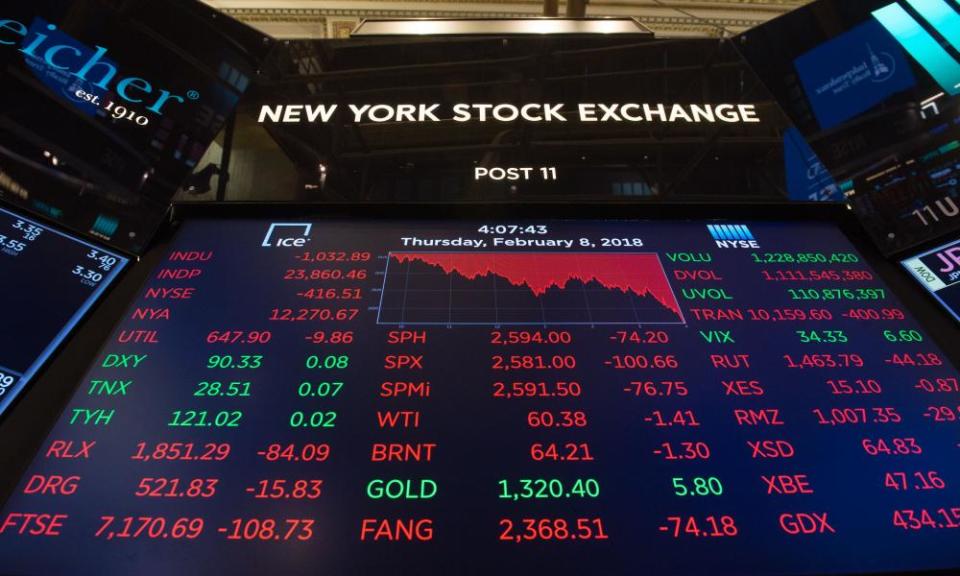Wobble on Wall Street but what are the underlying pressures?

Get ready for phase two of Wall Street’s wobble. That was the fearful advice when the latest American inflation figures provided evidence that underlying cost of living pressures were surfacing in the world’s biggest economy.
The thinking seemed impeccable. When shares were plunging last week the reason was that the markets thought rising inflation would prompt the Federal Reserve – the US central bank – into a series of interest rate rises this year. That assumption was certainly not challenged by figures showing that core inflation in the latest three months has been running at its highest annualised rate in more than six years.
Likewise, Wall Street spent last week closely monitoring the yield on 10-year Treasury bonds, a key measure of long-term interest rates. Investors think the trigger for a real sell-off in equities will be when the 10-year bond yield hits 3%. After the inflation data was released it rose to just under 2.9%.
All of which shows that there is no rhyme or reason to financial markets, because shares were up on Wall Street in early trading.
Even though inflation was stronger than the markets had been expecting, this could be a classic example of buy the rumour, sell the fact. Markets had always assumed that the Fed would raise rates next month.
This, though, is not an entirely convincing explanation because the real concern for Wall Street is how many more rate rises the Fed will deem necessary after the March hike. The central bank is worried not just about rising core inflation but also about the impact of Donald Trump’s tax cuts, which it thinks will lead to stronger demand, a bigger budget deficit, weaker dollar and higher imported cost pressures.
What does all that mean? It means there is a risk of one rate rise a quarter in 2018, a process that will eventually mean slower growth and lower corporate profits. That will not be good for Wall Street.
Shovels at Persimmon
A good piece of advice for anybody in public life is that if you are in hole the best course of action is to stop digging. But Jeff Fairburn, chief executive of the housebuilder Persimmon, is still shovelling like mad.
Fairburn became caught up in a public relations firestorm after it was revealed that he stood to trouser a £110m bonus, not because of his own managerial brilliance but because Persimmon made lots of money from the government’s taxpayer funded Help to Buy scheme. The bonus plan, set up before Fairburn joined the company, was linked to the company’s share price and was uncapped, which explained the size of the payout.
Fairburn’s initial response was the L’Oreal defence; he and his fellow executives were getting the bonuses because they were worth it. Move along, please, no story here.
Since then, though, he has second thoughts. He has issued a statement saying that he did not ask for the bonuses to be paid and did not think it right he should be getting them. He was planning all along to give a large chunk of the money to his favourite charities.
In his statement, Fairburn says he is an old-fashioned sort of guy who thought this business a private matter between him and his conscience, but in the light of everything that has happened he has decided to let the world know about his largesse.
Well, after a fashion. There is no detail about what the charities are or when they are likely to get Fairburn’s donations. Most significantly of all, he does not reveal how much of the £112m he is going to forego.
In years to come, Fairburn’s case is likely to be shown to budding PRs as an example of how not to do it. Far too little. Far too late.
Wasteland recedes for BOE
Those convinced that the economy has been turned into a wasteland as a consequence of the Brexit vote might like to cheer themselves up by reading the latest report from the Bank of England agents, who act as the eyes and ears of Threadneedle Street in the UK’s regions.
The latest report showed activity holding steady at a modest pace, firms having trouble filling posts, exports of goods rising, firms investing more in automation and robots to improve efficiency, and wage growth picking up, in part because of the impact of the minimum wage. Not a lot of evidence, in fact, to suggest that the economy is about to hit the wall.
Follow Guardian Business on Twitter at @BusinessDesk, or sign up to the daily Business Today email here.

 Yahoo Finance
Yahoo Finance 